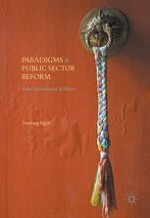2016 | OriginalPaper | Buchkapitel
4. Bhutan’s Approach to Public Administration from Modernisation to the New Millennium
verfasst von : Lhawang Ugyel
Erschienen in: Paradigms and Public Sector Reform
Aktivieren Sie unsere intelligente Suche, um passende Fachinhalte oder Patente zu finden.
Wählen Sie Textabschnitte aus um mit Künstlicher Intelligenz passenden Patente zu finden. powered by
Markieren Sie Textabschnitte, um KI-gestützt weitere passende Inhalte zu finden. powered by
